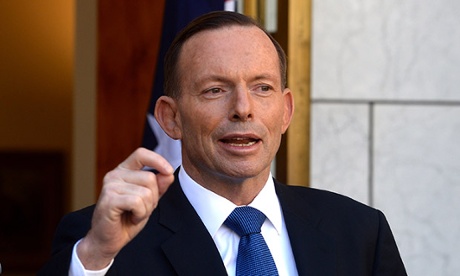John Faulkner's call for trust drowned out by all the stunts
Tony
Abbott and Bill Shorten have no time listen to the Labor elder’s
critique of stunts because they’re too busy heading to their next one
Abbott and Bill Shorten have no time listen to the Labor elder’s
critique of stunts because they’re too busy heading to their next one

Poll? What poll? Tony Abbott tells reporters he is not concerned federal politicians rated so low on a poll about trust.
Photograph: lan Porritt/AAP
John Faulkner put a big proposition
before federal politics this week. The Labor elder spoke about trust.
Trust, he contended, was not some quaint abstraction. In politics, trust
is hard currency. Trust actually allowed politicians to take on big,
unpopular reforms in the national interest. Without trust – the singular
magic that allowed for recurrent acts of courage – politics was little
more than a bunch of disconnected stunts and a not very compelling
personality contest.
Politics, predictably, ignored John Faulkner (what, him again, hasn’t
he left yet?) – and rolled on with another cheery week in stuntsville.
Some edited highlights. Tony Abbott rang in for a chat
with his sometime antagonist and some time life coach Alan Jones. After
apologising first for his tardiness, and then for his lack of immediate
recall about the treachery provisions of the crimes act, the prime
minister promptly declared his intention to “red card” hate preachers.
What did this short and satisfying sizzle for Alan actually mean? Well,
apparently it meant the government would continue to do what governments
periodically do, which is refuse to give unwelcome visitors visas on
character grounds, and proceed with efforts to strengthen
counter-terrorism provisions.
Bill Shorten indulged in a short session as empathiser-in-chief about
cost of living, holding a public event in Brisbane in front of a snazzy
new backdrop flanked by colleagues Terri Butler and Sam Dastyari. Bill
understood that things were expensive. Dastyari, quite understandably in
the context of the (non-) event and Shorten’s rather meandering
descriptions of it, suppressed yawns rather too often. (Cost of living.
It’s terrible. Somebody should get on to that.)
The attorney general, George Brandis, held a short, strange press conference in which he told
assembled journalists that the retired judge conducting the
government’s royal commission into various alleged nefarious conduct(s)
by trade unions and officials had sought an extension of time to pursue
criminality. A closer reading of the correspondence supplied by Brandis
indicated the commissioner had been rather more ambiguous about this
“request”, which was, according to the man making it, “neither an
application to widen the terms of reference nor an application to extend
the reporting date”.
Somebody, meanwhile, forgot to tell Joe Hockey, off in Washington,
that expressions of bipartisanship on Iraq must trump his more immediate
problem of making the columns in the budget papers add up. Hockey
either didn’t get the talking points about how good Bill was being on
Iraq, or he didn’t read them. Hockey was busy, after all, embarking on
the task he spent much of opposition roundly bagging Wayne Swan for
doing – moving the goal posts about budget forecasts that were proving
about as wobbly as jelly. Poor old Joe. Rough going at the moment, it
must be said. A more paranoid type might begin to fret about the prime
minister’s escalating habit of hanging him out to dry.
Meanwhile, in chambers of substance, various things occurred. Bret
Walker – an eminent lawyer who knows the odd thing about national
security law, having studied the Australian regime as independent
legislation monitor – pointed out
in an intelligence committee hearing that laws aiming to make it easier
to prosecute jihadists returning from overseas were strangely drafted
and would likely not work as intended. (That sort of thing is known in
the trade as “wut”, quickly followed by “woopsie”.)
It emerged
that a government department that has been working for years (let’s
repeat that, years) on the premise that Australia absolutely must have a
mandatory data retention scheme (where a trove of ordinary folks
private communications data is held for two years just in case police or
some person from the RSPCA needs it) still has no clear advice about
how such a scheme will actually work in the real world. But why get
wound up? There’s still a couple of weeks to sort that out.
And of course, we went to war.
Officially. Australian Super Hornets this week ended their period of
flights without engagement, and went after an Islamic State target.
Australia undertook the first sortie in what will be a long military
campaign with highly uncertain domestic and international consequences.
Politics doesn’t get more substantial than that.
So what, then, of Faulkner’s point? Is trust in politics really
necessary? Some would argue that it’s not. Our hard-wired tendency to
discount most everything uttered by a professional politician has not
stopped Australia succeeding more often than it fails when it comes to
policy-making in the national interest.
But everything has a tipping point. Faulkner’s long-view judgment
that politics has entered genuinely existential territory is not without
merit. One of the most perplexing trends in politics right now is its
apparent appetite for working against its own long-term self-interest,
in small things and in big things.
Faulkner didn’t term his diagnosis in this way, but his argument was
essentially the cabal culture which now dominates in professional
politics has reached such a nadir that major party powerbrokers don’t
actually mind if they are on the Titanic as long as they have plush
seats.
There was another poll this week
underscoring the distance between the voters and post-fact post-truth
Canberra. A poll of 1,200 voters now apparently rates the federal
government behind state and local governments on trust. The prime
minister, feeling genial after a Coag meeting, made light of this rather
grim milestone on Friday. “I think the surveys are lagging indicators
if I may say so,” he said.
Abbott’s broad diagnosis was firmly in the “ever thus” camp.
Australians pride ourselves on our disdain for politics. Of course we
tell polling companies we don’t trust politicians. “There are always
going to be people who are disappointed with government because, let’s
face it, we cannot do everything that everyone would like us to do
immediately. We just can’t.”
This statement is both true, and misleading. The breeziness in the
face of voter contempt completely ignores all the things politics can
actually do to deal with the current authenticity challenge: curtail the
empty gestures, deal in facts, say what you mean, do what you say, and
get serious about things such as funding and disclosure reform so voters
know where the money stops and the decisions start. Just get serious,
full stop.
But if you can’t get serious, there is always another formulation to
get you through the current press conference. Abbott: “We have repealed
the carbon tax and the mining tax. We have more or less stopped the
boats. We are working more effectively than the critics would concede to
bring the budget back into balance and I think over time, if government
is competent and trustworthy, the public will respond appropriately.”
As is sometimes said in the classics, only time will tell.


No comments:
Post a Comment